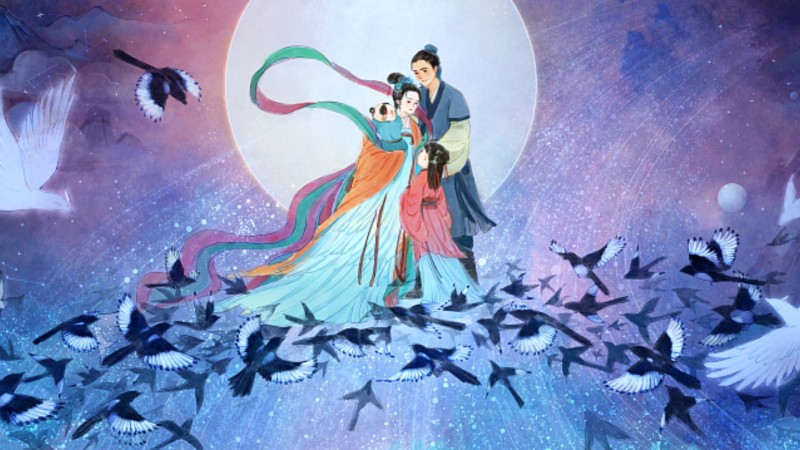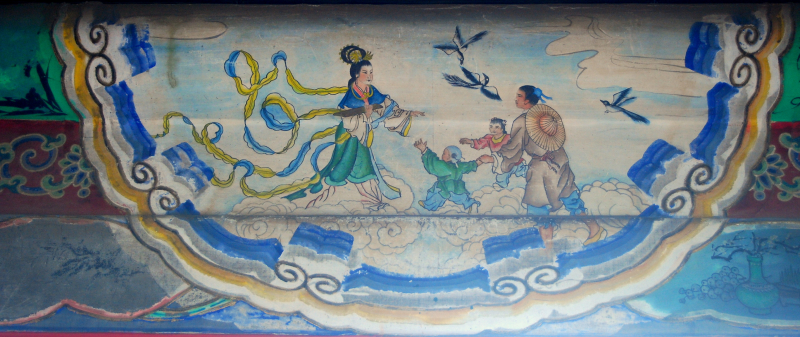The Weaver Girl and the Cowherd

The story of the Cowherd and the Weaver Girl has its origins in Chinese folklore. While the folktale has various variations, the core of the story focuses on the annual union of two lovers. The narrative starts with seven fairy sisters living in paradise. They traveled to the mortal world one day after getting permission from the Goddess of Heaven. They chose to take their time to complete the journey because they had received permission from the Goddess after many denials. When they arrived in the mortal realm, they decided to take a bath in a lake near the cow herder's house. They laughed, splashed in the water, and loved their time together. However, the noises made the cow herder awaken from his nap and get up to investigate the disturbance. He could see the fairies swimming as he got closer to the lake.
He stole their garments and waited to see what would happen, encouraged by his naughty companion the ox. Zhinu, the youngest and most attractive of the fairy sisters, was chosen to collect their garments. She agreed to do so, but after Niulang saw her, she agreed to his marriage proposal. She was a beautiful wife, and Niulang was a decent and caring husband. They had two children and lived peacefully on Niulang's farm. The other six fairies, who were barred from marrying mortal men, worried about their sister after spending a lot of time in the mortal world. The fairies kept it a secret because they did not want Zhinu's marriage to the mortal cow herder to be revealed to the Goddess of Heaven.
However, the Goddess discovered the two's marital relationship and ordered Zhinu to return to heaven to continue her former duties of weaving colorful clouds, which she had ignored while living on earth with a human. On Earth, Niulang was devastated that his wife had vanished. He couldn't imagine living without her. Seeing his master's anguish, Niulang's ox advised him to slaughter him and put on his hide in order to travel to paradise and reunite with his fairy wife. The cowherd murdered his ox and put it on his skin, regretting his actions. He took both of his children to see Zhinu since he could travel to heaven.
After becoming enraged by the cowherd's behavior, the Goddess of Heaven used her hairpin to create a vast river in the sky to permanently divide the two lovers, creating the Milky Way between Altair and Vega. Niulang must watch Zhinu from a distance and take care of their two children as she toils away on her loom for all eternity on one side of the river. But after much thought and deliberation, the Goddess of Heaven finally permitted Niulang and Zhinu to spend one night together every year. As a result, once a year, all of the magpies in the world would take pity on them and fly up into heaven to create a bridge over the star Deneb in the Cygnus constellation, allowing the lovers to be together for a single night, the seventh night of the seventh moon.
The annual meeting of the cowherd and weaving girl is commemorated in China by the Qixi Festival, sometimes called the Qiqiao Festival. On the Chinese calendar, the festival is observed on the seventh day of the seventh lunisolar month. The celebration has its roots in the veneration of natural astrology. While the story encourages us to discover our soul mates, it also teaches us that partners must support one another through difficulties. As a result, if you're looking for a partner, think about the story of the Cowherd and the Weaver Girl and keep in mind not to give up in the face of challenges or trials. And if you already have a partner, remember to express your love, affection, and thanks to them for better or for worse, richer or worse, in sickness and in health, till death do you part.















